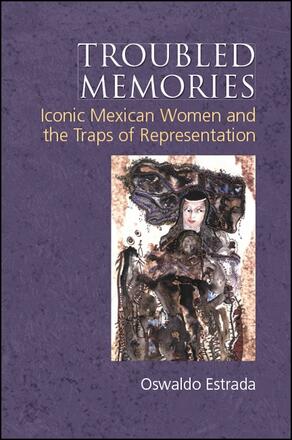
Troubled Memories
Iconic Mexican Women and the Traps of Representation
Alternative formats available from:
Analyzes literary and cultural representations of iconic Mexican women to explore how these reimaginings can undermine or perpetuate gender norms in contemporary Mexico.
Description
2019 CHOICE Outstanding Academic Title
In Troubled Memories, Oswaldo Estrada traces the literary and cultural representations of several iconic Mexican women produced in the midst of neoliberalism, gender debates, and the widespread commodification of cultural memory. He examines recent fictionalizations of Malinche, Hernán Cortés's indigenous translator during the Conquest of Mexico; Sor Juana Inés de la Cruz, the famous Baroque intellectual of New Spain; Leona Vicario, a supporter of the Mexican War of Independence; the soldaderas of the Mexican Revolution; and Frida Kahlo, the tormented painter of the twentieth century. Long associated with gendered archetypes and symbols, these women have achieved mythical status in Mexican culture and continue to play a complex role in Mexican literature. Focusing on contemporary novels, plays, and chronicles in connection to films, television series, and corridos of the Mexican Revolution, Estrada interrogates how and why authors repeatedly recreate the lives of these historical women from contemporary perspectives, often generating hybrid narratives that fuse history, memory, and fiction. In so doing, he reveals the innovative and sometimes troublesome ways in which authors can challenge or perpetuate gendered conventions of writing women's lives.
Oswaldo Estrada is Professor of Latin American Literature at the University of North Carolina at Chapel Hill and the author of Ser mujer y estar presente: Disidencias de género en la literatura mexicana contemporánea and La imaginación novelesca: Bernal Díaz entre géneros y épocas.
Reviews
"…Estrada does us a favour in correcting the 'troubled' image given to readers by other popular modern works that are not careful with history or friendly toward women who step into the public sphere. " — Bulletin of Spanish Studies
"This book is indispensable for scholars of Mexican literature, in particular those focusing on women and gender studies. " — CHOICE
"A leading scholar on gender and literature, Oswaldo Estrada delivers a thorough, rigorous, and exciting account on the persistence of female icons in contemporary culture. Steeped in his deep knowledge of Mexico's cultural history, Estrada's book is a key contribution to questions of gender, iconicity, and the interrelations between popular and literary culture—a must read for scholars and students. " — Ignacio M. Sánchez Prado, author of Strategic Occidentalism: On Mexican Fiction, the Neoliberal Book Market, and the Question of World Literature
"By studying the way some of the most prominent female Mexican icons of all time have been reimagined in contemporary fiction and transformed into objects of consumerism, symbols of national identity, and memories of the past, this book fills a dire need in the Mexican studies field. The scholarship is exemplary, the style is impeccable, and reading the author is a pleasure. " — Patricia Saldarriaga, Middlebury College